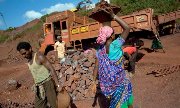
ndian labourers load a truck with iron ore. Photograph: Adam Ferguson/Getty News
|
 India's 'lawless' mining industry criticised by Human Rights Watch India's 'lawless' mining industry criticised by Human Rights Watch
focuses on iron iron mining in Goa and Karnataka to illustrate a broader pattern of failed regulation, alleged corruption and harm to local communities.
In Karnataka, BS Yeddyurappa resigned as chief minister last year after being indicted by an anti-corruption panel in an illegal mining scandal that allegedly cost the exchequer more than £1.8bn between 2006 and 2010. The southern Indian state, where illegal mining is rife, produces about 45m tonnes of iron ore a year and exports more than half of it to China.
India's mining sector has experienced a boom driven by strong international demand. The country produced around $44bn worth of minerals during 2010-11, with the total more than doubling between 1993 and 2011. India's mines also directly employ several hundred thousand people and indirectly help sustain the livelihoods of many thousands more.
However, the sector is rife with illegality. The most brazen criminality involves the extraction of minerals from land that a mine operator has no legal right to work on. In some cases, this occurs deep in isolated forests or in the form of fly-by-night operations with only a few machines and labourers working in a very small area.
As lurid as some of India's mining-related corruption scandals have been, the more widespread problem is government indifference, according to HRW.
"Even in Karnataka, ineffectual regulation played a key role in allowing criminality to pervade the state's mining sector," says the report. "And many of the alleged human rights abuses result not from patterns of corruption or criminality but from the government's more mundane failure to effectively monitor, let alone police, the human rights impacts of mining operations."
The report says the government often leaves companies to regulate themselves, which has proven disastrous in India and around the world. The government, for example, relies on mining companies to commission and produce the "independent" environmental impact assessments (EIA) that are used to gauge a proposed mining project's likely environmental, social and human rights impacts.
This, says HRW, creates an unnecessary conflict of interest that could be solved by giving regulators a central role in commissioning the studies. The assessments also tend to give short shrift to human rights issues, focusing overwhelmingly on purely environmental concerns.
Worse still, HRW says there is considerable evidence that these EIA reports are often inaccurate or deliberately falsified. In some cases, issues of potential concern – the presence of rivers or springs, for example – are omitted. In one notorious example, a mine in Maharashtra received clearance to proceed even though its EIA report contained language taken verbatim from a similar report prepared for a bauxite mine in Russia.
Enforcement is an even bigger problem, says HRW, which found regulatory institutions hopelessly overstretched. A few dozen central government officials are responsible for overseeing the environmental and human rights impacts of every mine in India – and many other industries as well.
"This makes in-field monitoring a practical impossibility, forcing the government to rely almost exclusively on information provided by mine operators themselves," says the report. "Many state government oversight bodies have even less capacity to implement their challenging mandates. As a result, government regulators have no idea how many mining firms are complying with the law or how many communities have been harmed by illegal practices."
HRW acknowledges that the central government has taken some tentative steps toward improving oversight – such as requiring companies to choose from a list of accredited firms to carry out EIAs. But the reforms have not gone nearly far enough, says the group, which urges the government to adopt recommendations to narrow some of the most important regulatory gaps.
"Mining is an important part of India's economy, but that does not mean the industry should be allowed to write its own rules," said Meenakshi Ganguly, south Asia director at Human Rights Watch. "The government can and should empower regulators to do their jobs more effectively than they can today."
(2012-06-14/guardian)
|





